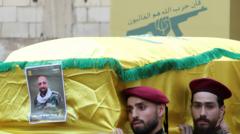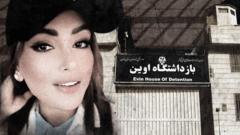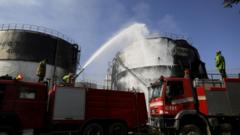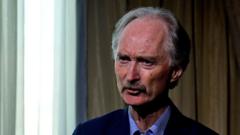The director general of the International Atomic Energy Agency, Rafael Grossi, expressed deep concern over Iran's surge in uranium enrichment to 60%, close to the threshold needed for a nuclear weapon. While Iranian leadership currently distances itself from nuclear armament discussions, the geopolitical implications and potential military responses are under scrutiny.
Rising Concerns: Iran's Increasing Uranium Enrichment Draws Attention from Global Leaders
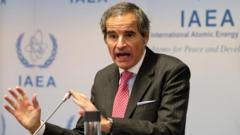
Rising Concerns: Iran's Increasing Uranium Enrichment Draws Attention from Global Leaders
The IAEA's Rafael Grossi highlights the alarming escalation of Iran's uranium enrichment amidst regional tensions and calls from Iranian politicians for nuclear capabilities.
The head of the International Atomic Energy Agency (IAEA), Rafael Grossi, has raised alarms regarding Iran's recent decision to significantly amplify its uranium enrichment activities, indicating a "very worrisome" trend. In an interview with the BBC, Grossi highlighted that Iran's enriched uranium stockpile now includes a substantial quantity at 60%, a concentration perilously close to the thresholds traditionally associated with nuclear weapons production.
Grossi's comments have resonated with many regional observers, who interpret Tehran's nuclear advancements as a reaction to recent military and diplomatic hurdles experienced by the country, particularly in Syria, Lebanon, and Gaza. Despite this backdrop, Grossi noted that, according to discussions with Iranian officials, there remains no firm commitment from the current Iranian leadership toward the pursuit of nuclear weapons capabilities, despite vocal factions within the nation advocating for such a course of action.
The remarks came during the Manama Dialogue conference in Bahrain, where Grossi cautioned Israel against taking preemptive military action against Iranian nuclear sites. An attack, he warned, would likely prompt serious retaliation and potentially radiological harm.
In a recent IAEA report, it was revealed that Iran has been feeding more enriched uranium into its Fordow facility. The revised operational methods have allowed for a dramatic increase in production rates, escalating from around 4.7 kg to 34 kg per month of uranium enriched to 60%. Given these changes, the IAEA has stressed that there is an urgent need for enhanced safeguarding measures to ensure the legitimacy of Iran's nuclear operations.
Despite Iran's denial of any aspirations toward a military nuclear program, Grossi acknowledged that the nation’s nuclear capacity has expanded significantly in the past decade. He underscored the evolutionary trajectory of Iran’s program, noting that the current state is markedly removed from what was observed in 2015, suggesting an unexpectedly accelerated path towards potential nuclear weaponization.
Despite recent assurances from Iranian leaders during Grossi's visit last month regarding their intent to limit uranium production, the lack of progress in ongoing nuclear negotiations with European powers has prompted Iran to escalate enrichment activities. Grossi highlighted the pressing global concern that other nations may also consider acquiring nuclear weapons as established nuclear states modernize their arsenals, suggesting a broader trend in the geopolitics of nuclear armament.
Furthermore, the IAEA chief reiterated the importance of diplomatic solutions to mitigate risks associated with nuclear proliferation, urging channels of communication to remain open in addressing mutual concerns among nations about the implications of Iran's nuclear advancements.

